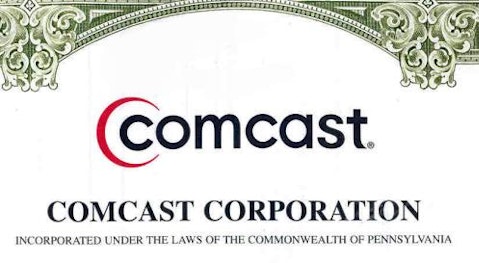To hear the stock touts tell is, Comcast Corporation (NASDAQ:CMCSA) took General Electric Company (NYSE:GE) to the cleaners, agreeing to pay $16.7 billion for the rest of NBC Universal. Comcast had paid $6.5 billion, plus its own programming assets, for the front half of the deal. NBCU was valued at $30 billion in 2011. The new agreement values it at over $33 billion, a nice premium over two years.
The announcement caused both stocks to pop, but Comcast popped much more. At its recent price of over $41, its earnings multiple is up to nearly 19, compared with just 17 for GE. Most seem to think Comcast has done better than GE.

What Comcast gets is full vertical integration. Like the Hollywood studios of old, Comcast will control the programming, its distribution, and the theaters it runs in, in the form of its cable networks.
It’s a great deal. When you produce a show you determine its costs. When you broadcast it you determine its price. And the money stays in your hands all the time. You can inflate costs and write it all off, pay yourself whatever you want. And since only one cable goes by customer homes – phone overbuilding is still rare – they really don’t have a choice. They have to pay what you charge, or do without programming.
To make this happen, of course, Comcast has taken on a lot of debt, $35 billion as of the end of the year. The company is clearing out its cash draws and taking on another $6 billion in debt to fund this deal. It’s also getting out of the wireless business.
With this deal Comcast bets that it can continue to raise prices on its content, and that viewers won’t mind the full integration of news, sports, and shows it plans to deliver. This is not a bad bet. The question is what kinds of gains are really possible – cable penetration has been on a long-term downtrend for years.
General Electric Company (NYSE:GE) Doubles Down on Boom
What does GE get from all this? The company already has $125 billion in cash on its books. The money from selling NBC Universal will give it an Apple Inc. (NASDAQ:AAPL)-like $140 billion.
Of course, as an industrial company and major financial power, GE also has plenty of debt on its books., $414 billion to be precise. But don’t look at this the way you do a car company. For a financial concern — and GE’s asset base would put it among the 10 largest bank holding companies — liquidity like this is mother’s milk.
GE now has the cash to go on its own spending spree, adding to its assets in engines, in energy, and in healthcare. It could easily buy the two largest 3D printing companies with seat cushion money. It can roll out its solar panel manufacturing facility in Colorado without a qualm, and add that to its wind assets.
In all the areas that are going to be part of this decade’s boom – manufacturing, energy, robotics – GE is in the center of it. It has the potential, now, to be the Microsoft Corporation (NASDAQ:MSFT) of this decade. Not bad for a company put together by J.P. Morgan in the 1880s. The new company is remarkably like the one Morgan first put together – focused on maintaining stable input prices for a new manufacturing boom.
Buy GE
Jeff Immelt has been CEO of GE since 9/11. During that time he has completely transformed the business, away from the content and consumer technology that represented the booms of the 1990s, toward industrial production and manufacturing.
Shareholders have had to be very patient, and I’ve lost some of mine. I took a loss on 100 shares last year. But I’m now willing to double-down on the company, because every boom is different, and this one looks set to be based in just those areas where GE is strongest.
The way I see it, you can either buy the present or the future. I’d rather have the future.
The article Who Got the Best Deal, Comcast or GE? originally appeared on Fool.com and is written by Dana Blankenhorn.
Copyright © 1995 – 2013 The Motley Fool, LLC. All rights reserved. The Motley Fool has a disclosure policy.



